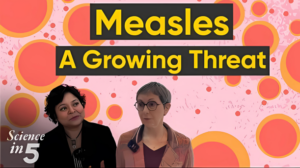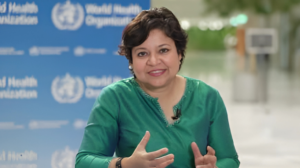A Conversation with WHO’s Vismita Gupta-Smith
“It isn’t easy to communicate science and public health nowadays. Our world is polarized from the global level right down to our dinner tables,” says Vismita Gupta-Smith, an American who helps shape WHO’s communications strategy. “This polarization impacts the decisions that we make about our health.” That’s why Gupta-Smith works hard to ensure the organization’s lifesaving guidance reaches people everywhere. “People are looking for information they can trust,” she says. “WHO is committed to science, solutions and solidarity. I am proud to work for WHO.”
“WHO is committed to science, solutions and solidarity. I am proud to work for WHO.”
In a time when global health challenges are mounting—from new threats to age-old diseases—the United States remains one of the most influential actors in the health space. Nowhere is this more visible than at WHO. Less visible are the countless Americans behind the scenes at WHO keeping the threats at bay.
Gupta-Smith is one of those exemplary Americans.
Communicating Science and Public Health
 Born in India and naturalized in the U.S., Gupta-Smith has two degrees—one from India’s top medical school and another from its leading film institute. She blended her passions into a role creating and producing health content that reached audiences across 36 countries.
Born in India and naturalized in the U.S., Gupta-Smith has two degrees—one from India’s top medical school and another from its leading film institute. She blended her passions into a role creating and producing health content that reached audiences across 36 countries.
From India to the U.S., she continued her career at a public access television channel in Atlanta, Georgia, and later in Washington, D.C.—cities known for their vibrant mix of grassroots energy and policymaking influence. These experiences laid the foundation for her current position at WHO, where she’s a strong voice for communicating science in plain language. She also hosts Science in 5, the organization’s longest running podcast, which began during the COVID-19 pandemic to help explain the evolving and uncertain science to the public.
“I want to make sure the mother, the housewife, the person making decisions on nutrition, reproductive health and mental health have the latest information they need to make the right choices for the whole family,” Gupta-Smith explains. “That means translating technical information into plain, accessible language across cultures.”
“I want to make sure the mother, the housewife, the person making decisions on nutrition, reproductive health and mental health have the latest information they need to make the right choices for the whole family. That means translating technical information into plain, accessible language across cultures.”
“Right now, the most urgent work I do is to tackle falsehoods,” she says. That quest for facts—whether through podcasts, campaigns or strategic messaging—is one of the most critical frontiers in public health; Gupta-Smith is at the forefront. “My work is to empower people with evidence-based information that helps them in that already-challenging task of making the healthy choice the easiest choice.”
“My work is to empower people with evidence-based information that helps them in that already-challenging task of making the healthy choice the easiest choice.”
From Atlanta to Geneva: A Global Lens Grounded in Local Realities
Combating misinformation comes at a time when the connections between local issues and global consequences are acutely apparent. “WHO receives over 100,000 signals a month, analyzing them daily to determine potential global health threats,” she says. “This is also why having that ‘kitchen table to global arena’ perspective matters. We’re seeing that connection between the local and the global play out right now on the funding front. What happens in America really does impact lives all around the world.”
“We’re seeing that connection between the local and the global play out right now on the funding front. What happens in America really does impact lives all around the world.”
 Her point is sharp—and timely. With growing threats to global health, including rising antimicrobial resistance, emerging diseases and climate change, the ability of WHO to respond quickly and effectively depends in large part on stable funding. U.S. investment plays a pivotal role in that equation.
Her point is sharp—and timely. With growing threats to global health, including rising antimicrobial resistance, emerging diseases and climate change, the ability of WHO to respond quickly and effectively depends in large part on stable funding. U.S. investment plays a pivotal role in that equation.
“U.S. investment in WHO and global health keeps America safe because diseases do not respect borders,” Gupta-Smith stresses. “WHO has plans to eliminate 32 diseases in the next decade. This can only be done through global partnerships. It is clear that in today’s interconnected world, each country is only as safe as the weakest health system. This is why everyone needs to care about investing in global health.”
America’s Enduring Legacy at WHO
From the early days of WHO’s founding, American leadership has contributed to the organization’s achievements. The U.S. helped establish key research partnerships and provides essential technical expertise and leadership.
Gupta-Smith doesn’t take that legacy lightly. “American funding helps fight diseases like polio and strengthens global health security. U.S. leadership and investment in global health keeps the world and America safe,” she underscores.
Giving People Control Over Their Best Life
In a world where health decisions affect everything from education and employment to security and social cohesion, the ability to communicate accurate, timely health information is a superpower. And it’s one Gupta-Smith wields with skill and care.
“At its best, health is about giving people control over their physical, mental and social wellbeing. I believe my work through WHO does just that,” she says.
“At its best, health is about giving people control over their physical, mental and social wellbeing. I believe my work through WHO does just that.”
